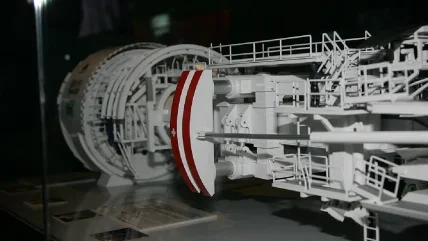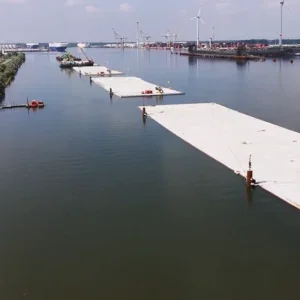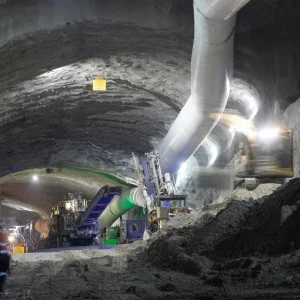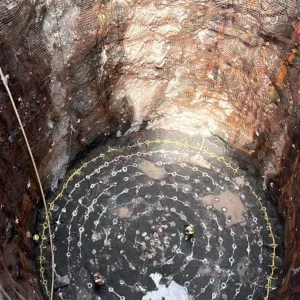
Mid-February finally saw publication for ‘CEN Enquiry’ of revisions to two standards vital to machinery safety in the international tunnelling industry.
‘CEN enquiry’ – the bureaucratic term in European standardisation for technical consultation – here concerns the revision of the existing standards EN 12110 – 1/2 ‘Tunnelling machines – Air Locks’, and EN 16191 ‘Tunnel Boring Machinery – Safety requirements’.
The Enquiry period, affording the tunnelling industry opportunity to give formal responses to the draft revisions of the standards, closes in mid-May.
The standards are the responsibility of CEN’s Technical Committee (TC) 151, Working Group 4 (WG4) – normally referred to as CEN/TC151/WG4.
The Enquiry is a once in a decade opportunity for the tunnelling industry to have a say on the technical content of what are arguably the most important machinery safety standards in mechanised tunnelling not only in Europe but in much of the rest of the world.
The document numbers are currently prefixed with ‘pr’, signifying the provisional status of the standards during the Enquiry, and in this case refers to prEN 12110 – 1/2 ‘Tunnelling machines – Air Locks’, and prEN 16191 ‘Tunnel Boring Machinery – Safety requirements’.
Although confined to Europe at present, it is likely that, once harmonised, EN 12110-1/2 and EN 16191 will be adopted by the International Organization for Standardization (ISO) and become dual numbered EN ISO standards, applicable worldwide.
REVISING STANDARDS
Normally, revision of a standard begins five years from the publication of the current edition. However, revision of the 2014 edition of these two CEN standards began sooner, in late 2017, and over the course of around 30 meetings the work has continued despite the limitations on travel imposed by the pandemic when virtual meetings became the norm.
The early start to the revisions of the CEN standards was because of the need to address topics such as high pressure compressed air, accessible cutterheads, mechanised/automated handling of segments, and slurry systems.
Procedurally, to prevent delay, the CEN organisation imposes a nine-month time limit between adopting the task (or, ‘Work Item’), when the European Commission (EC) issues a mandate for the work to proceed, and submission of the draft proposal for the CEN enquiry to get underway. Hence, it pays to have a well-developed provisional Work Item before member countries vote on adoption.
Apart from requiring a positive vote, a minimum of five countries also must agree to participate in the revision process.
The convenor of WG4 is Werner Burger from Germany. Other countries actively participating in WG4 are Austria, France, Netherlands, Switzerland and UK. The revision of EN 12110 is led by Dr Donald Lamont (UK) whilst the revision of EN 16191 is led by Werner Burger (Germany), the chief engineer with Herrenknecht.
The UK delegation comprises Dr Donald Lamont, Sean Martin and Steve Parker.
Dr Lamont has been involved in CEN/TC151/WG4 since its first meeting in 1989, firstly on behalf of the UK’s Health & Safety Executive (HSE) and latterly on behalf of the British Tunnelling Society (BTS).
Sean Martin (BTS and Pipe Jacking Association (PJA) is head of tunnelling with contractor Murphy, which is a major user of TBMs.
Steve Parker (BTS) is with Keystone Tunnelling and is highly experienced with both the practical aspects of TBM use and in also tunnel design.
Both Martin and Parker represent the user perspective within the Working Group. The BTS and PJA have provided extensive active support to WG4 since its formation.
CEN enquiry is the opportunity for all 33 CEN member countries to comment on the technical content of the standards. The enquiry period lasts for three months (in this case, mid-Feb to mid-May) after which WG4 has around six months (in this case by late 2023) to resolve the comments and produce a draft text for the Formal Vote by CEN member countries.
The Formal Vote determines whether the draft standard should become a harmonised European standard. Within a harmonised standard is a ZA annex, which is a table setting out how the standard addresses each of the Essential Safety Requirements (ESRs) of the current Machinery Directive (2006/42/EC).
Bureaucracy rules in CEN and for comments to be considered they must be submitted before the deadline and in a particular format – the CEN comment template. Deadlines are strictly adhered to, and comments must identify the clause in the text being commented on and the comment being made along with a suggested replacement text. Comments lacking a suggested text are ignored.
The BTS website has a consultation exercise.
Because a harmonised standard interprets the ESRs for a particular category of machine, the EC maintains a high level of scrutiny over its content. Prior to Formal Vote, each standard must be assessed by a ‘Harmonised Standards’ (HAS) consultant appointed by the EC to assess whether the standard drafted by CEN complies with drafting rules and with the Commission’s requests as outlined in the relevant standardisation mandate under which the standard has been produced.
Once harmonised, and listed in the Official Journal of the EU, these standards will come into effect in each CEN member country (as BS ENs in the UK).
Although UK has left the EU it remains a CEN member country and UK Conformity Assessment (UKCA) replaces CE marking. Harmonised standards become ‘designated standards’ in Great Britain. The Supply of Machinery (Safety) Regulations 2008 as amended for Brexit in 2019 apply.







